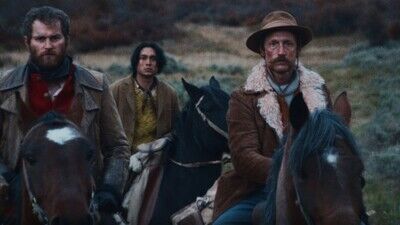“The Settlers” takes place in the early years of the 20th century, as “settlers” from multiple European nations participate in the South American land grab. The Spanish loom as the primary settlers in Chile, and the Indigenous population is treated with loathing and violence. The opening scene shows men building a fence in a wild open field, where the wind doesn’t just blow, it roars and rattles, huffs and puffs, like a malevolent sentient being. (The wind is practically another character in “The Settlers”. The sound design is superb.) Alexander MacLennan (Mark Stanley), resplendent and puffy in a British red coat, kills a worker who’s lost an arm. Nobody protests. It’s a reign of terror. Segundo (Camilo Arancibia), a mixed-race Chilean, keeps shoveling, trying not to call attention to himself.
MacLennan is in the employ of Spanish landowner José Menéndez (Alfredo Castro), who wants to create a path to the sea for his herds of grazing sheep. He taps MacLennan to scope out the unknown territory, and tells him to bring along Bill, an American mercenary from Texas (Benjamín Westfall). MacLennan needs a third and he chooses Segundo, who proves himself to be an excellent shot. It shouldn’t have to be said that Segundo doesn’t want to go. Bill is a virulent racist, with a special hatred for anyone of mixed race, and MacLennan is drunk and unpredictable. But Segundo doesn’t really have a choice in the matter. The three men set off into the vast Patagonian landscape, which, at first glance, only seems empty. Of course, the landscape is not empty at all. It’s crowded with terrified Indigenous people who have been hounded, murdered, raped and trafficked. There are also roving bands of so-called “settlers,” usually blind drunk, each trying to grab a piece of the pie by any means necessary.
Westerns have been Hollywood’s tentpole genre from the jump. For years, they were frank exercises in one-sided mythologizing (but even the one side wasn’t presented truthfully). Eventually, Westerns entered a necessary period of deconstruction, where the original mythologies were interrogated. In the ensuing decades, there has been a lot to interrogate.
“The Settlers” is too straightforward to be “clever”. It means what it says. It does not cloak what it’s doing in a philosophical framework; it has no irony. There are scenes of such depravity that it’s hard to watch (and it should be). Cormac McCarthy’s Blood Meridien is a similarly told tale, where violence bursts out of the seemingly empty desert without warning, where men literally go mad from all the things they’ve seen and done. “The Settlers” presents us with quite a few mad men, MacLennan, the Scotsman, being one. But Colonel Martin (Sam Spruell), whom they run into later after reaching the ocean, makes MacLennan look sane.

